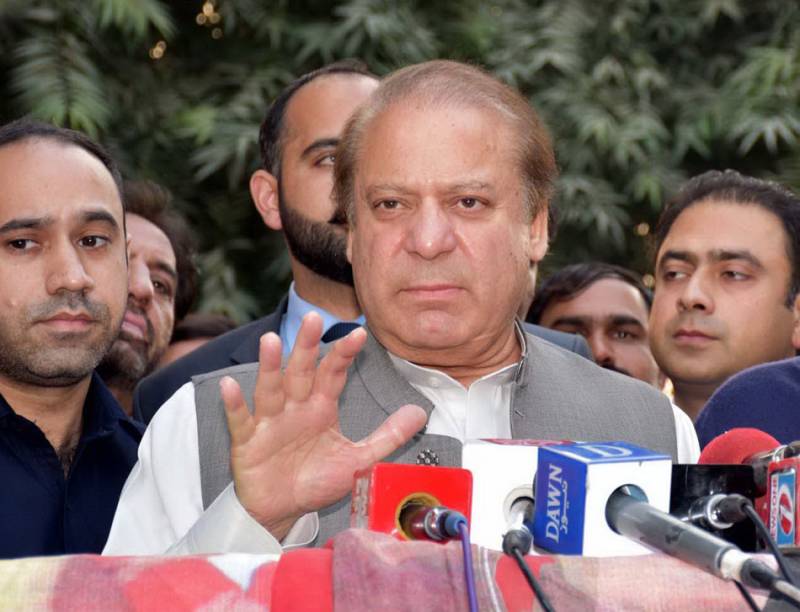ISLAMABAD - Prime Minister Nawaz Sharif has asked his diplomatic corps to make sure the United States does not shun Pakistan after Donald Trump takes over as president in January, The Nation has learnt.
Senior officials at the Foreign Ministry said that Pakistan was aiming to win enough confidence of the new US president that keeps Pakistan “in the game” – an effort to stop the US from being too close to India.
The officials said Pakistan was aware of the challenges during Trump’s presidency but was hopeful that the new president would acknowledge Islamabad’s commitment to peace and fight against terrorism.
Two senior diplomats in the US – Ambassador Jalil Abbas Jilani and permanent envoy to the UN Maleeha Lodhi – are already at work.
But even before Trump entered the White House, Washington said Pakistan “can and must” take more effective action against terror groups “operating from its soil.”
Outgoing President Barack Obama had said his country did recognise “the sacrifices of the people and the security forces of Pakistan in fighting some militant and terrorist networks” and supported such efforts but believed: “Pakistan can and must also take more effective action.”
With Trump coming in, Pakistan could expect more stern statements from Washington.
A senior official at the Foreign Ministry said Pakistan was hoping to convince the new US president about its efforts against terrorism and India’s propaganda to defame Pakistan.
“We know it will be hard to win Trump but it won’t be impossible. Washington does doubt our anti-terror policies but also acknowledges what we have done so far. The Trump administration will be briefed on our successes and our problems. We will try to neutralise India’s anti-Pakistan propaganda,” he added.
President-elect Donald Trump has announced hawks for three key posts: Lt-General (retd) Michael Flynn as national security adviser, Senator Jeff Sessions for attorney-general and Congressman Mike Pompeo as Central Intelligence Agency director.
All three have been fierce critics of President Barack Obama and the current US policy.
Reports said they were regarded, in some ways, as outliers from conventional Republican thinking, shunned at times for strident statements, controversial positions or highly partisan moves.
Donald Trump is considering General (Retired) James Mattis for Defense Chief.
Trump won the US presidential elections in a stunning culmination of an explosive and polarising campaign.
It was a surprise outcome, defying late polls that showed Hillary Clinton with a modest but persistent edge.
The triumph for Trump, a real estate developer-turned-reality television star with no government experience, was a powerful rejection of the establishment forces.
The results amounted to repudiation, not only of Clinton, but of President Obama, whose legacy is suddenly imperilled.
Trump sought to do something he had conspicuously avoided as a candidate: appeal for unity.
His campaign slogan “Make America Great Again,” appealed the voters.
Donald Trump’s surprise election as the US president has Pakistanis guessing that he may accelerate what they see as a shift in American policy to favour India in the long rivalry between nuclear-armed neighbours.
To many Pakistanis, Trump’s anti-Muslim rhetoric —- he once proposed banning Muslims entering the US —- and business ties to India were signs that his administration could shift further toward New Delhi.
“America will not abandon Pakistan, but definitely, Trump will be a tougher president than Hillary Clinton for Pakistan,” said Hasan Askari Rizvi, a foreign policy analyst.
“I think India will have a better and smoother interaction compared to Pakistan.”
Trump has yet to lay out a detailed policy for south Asia, although he recently offered to mediate between Pakistan and India in their dispute over Kashmir.
The president-elect also said he would favour keeping nearly 10,000 US troops in Afghanistan “because it’s adjacent and right next to Pakistan which has nuclear weapons.”
Adviser to Prime Minister on Foreign Affairs Sartaj Aziz said Pakistan was ready to work with Trump.
“Donald Trump has an agenda of economic development, and if the US economy revives as a result of mega infrastructure projects, entire world would benefit from it,” he said.
Aziz said as a leader of a superpower, Trump would not overlook Pakistan, which was one of the seven nuclear powers of the world.
Federal Minister for Defence Productions Rana Tanveer Hussain said Pakistan could not be ignored because of its strategic location.
“Donald Trump will hopefully enhance cooperation with Pakistan. Donald Trump’s first speech after winning the election was quite different from his electoral rhetoric,” he added.
Foreign Office Spokesman Nafees Zakaria said Pakistan was looking forward to working with Trump. “Trump has been elected by the American people. We hope to have good relations with him and the US,” he remarked.
Analyst Dr Muhammad Khan maintained Pakistani diplomats would have to work hard to win over the Trump Administration.
“Pakistan needs the US as a key partner in the defence sector. Our diplomats will have to ensure they strengthen ties with the US. Trump will be different than his elections speeches. We expect him to treat Pakistan on merit,” he remarked. –SHAFQAT ALI








